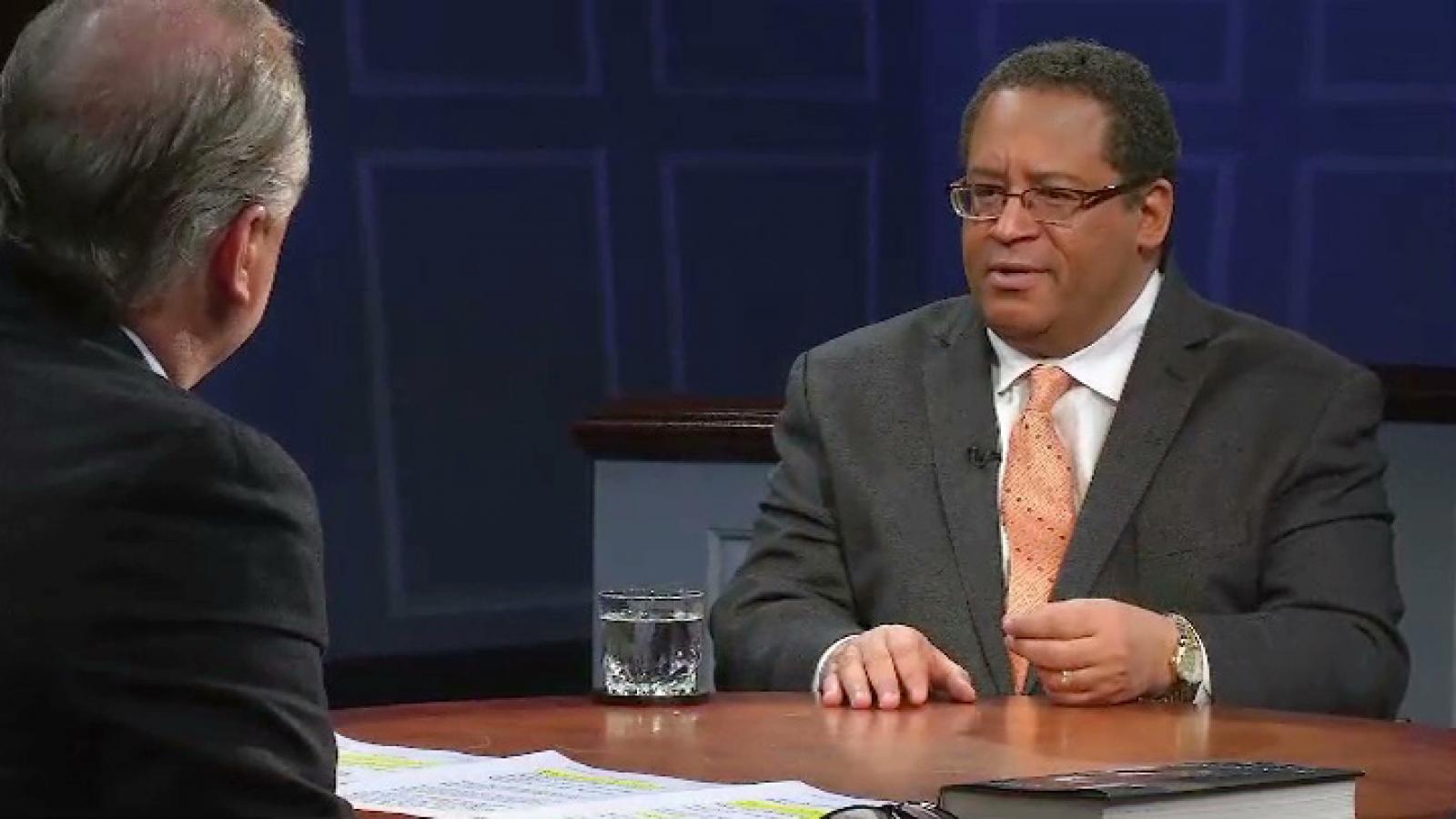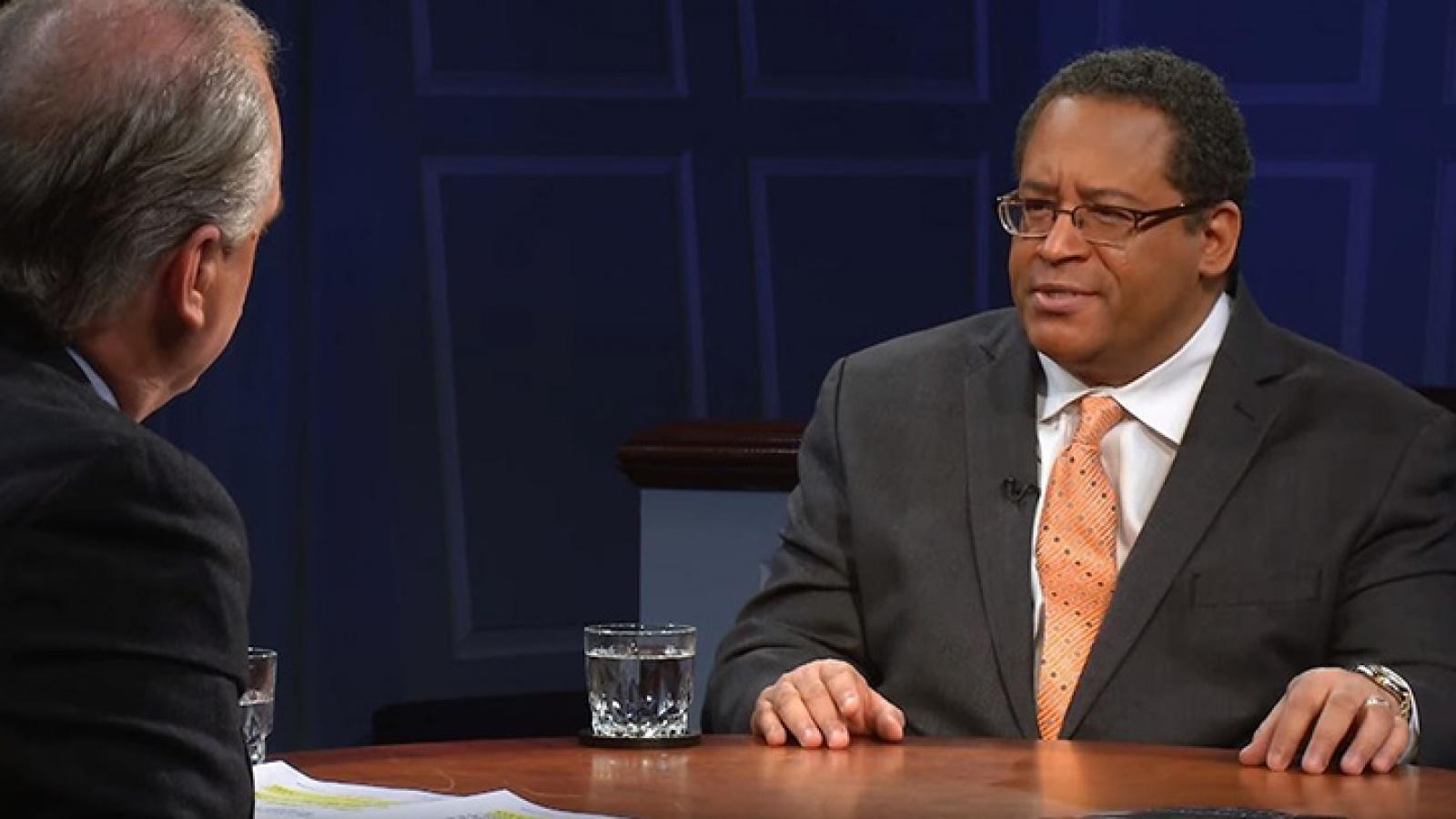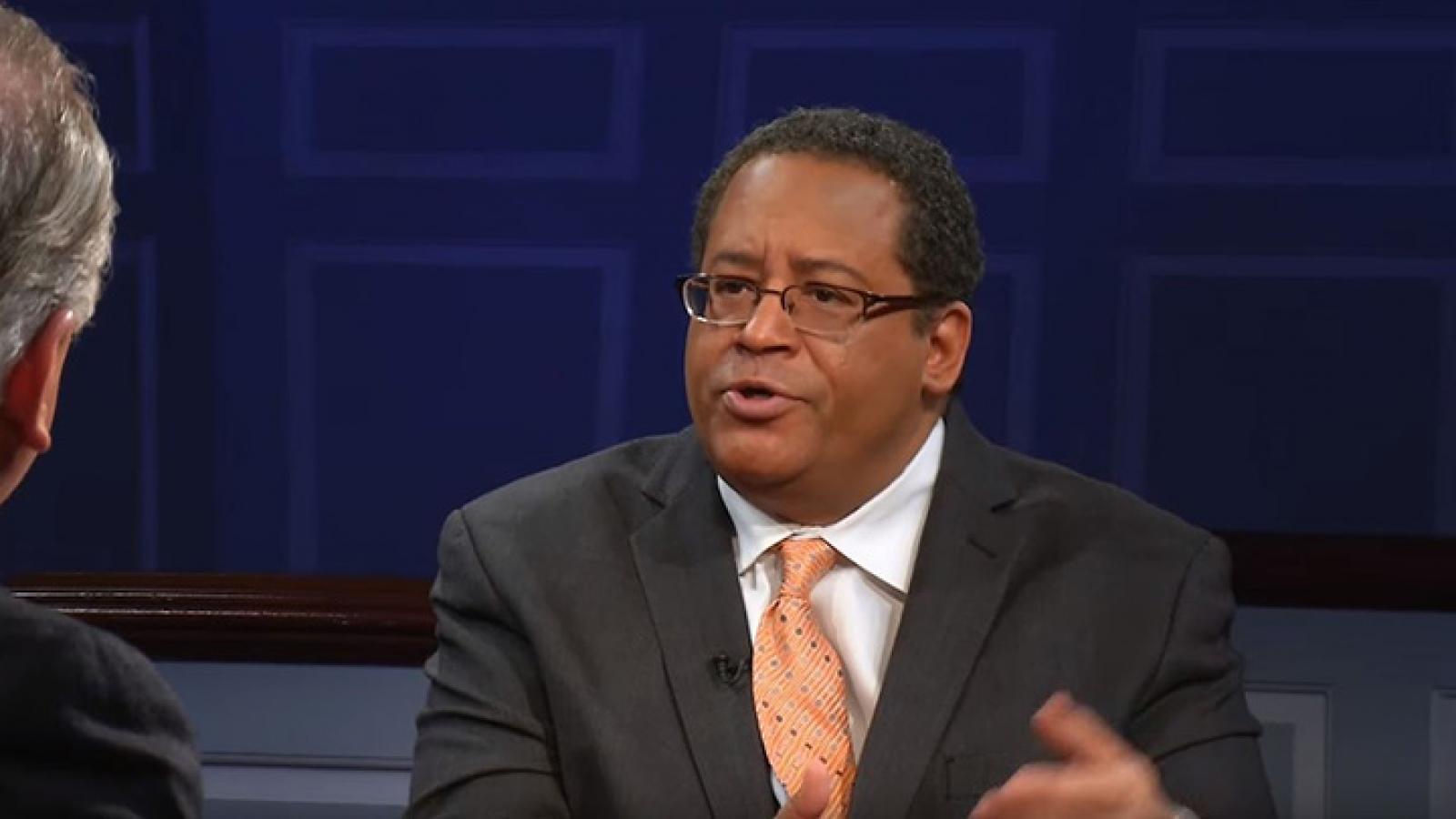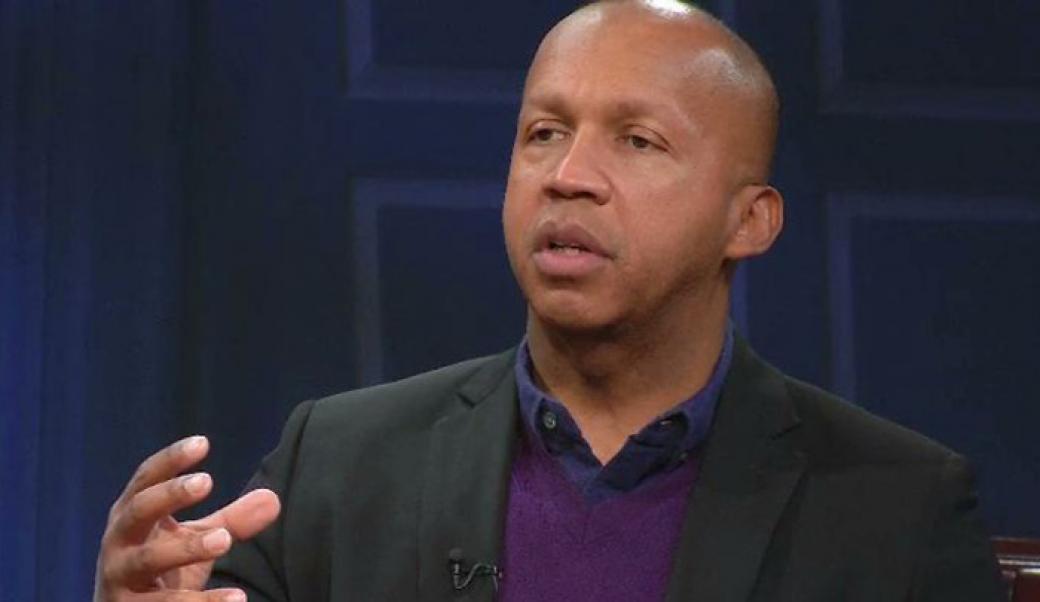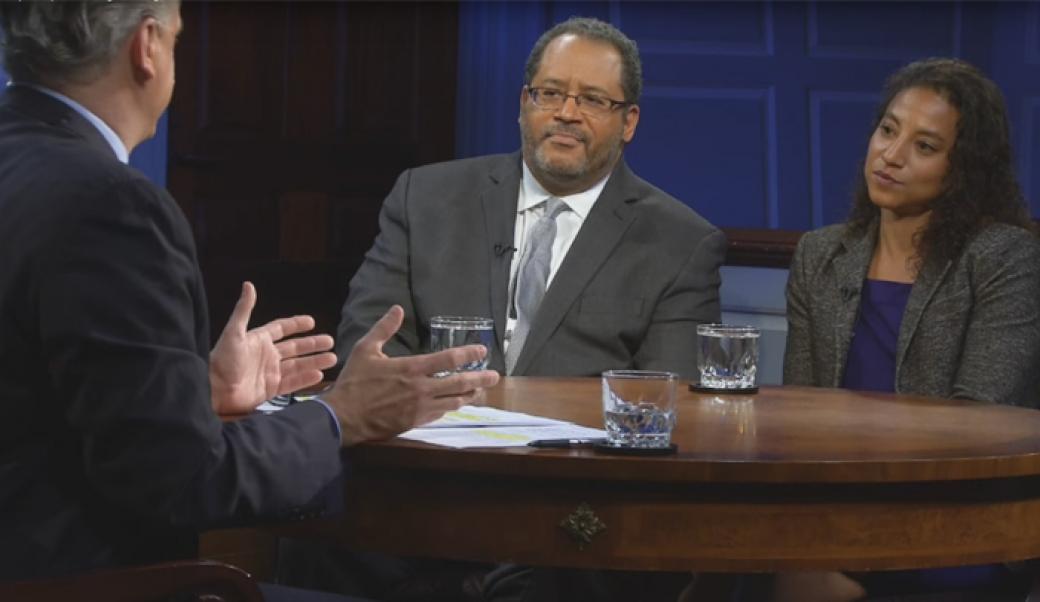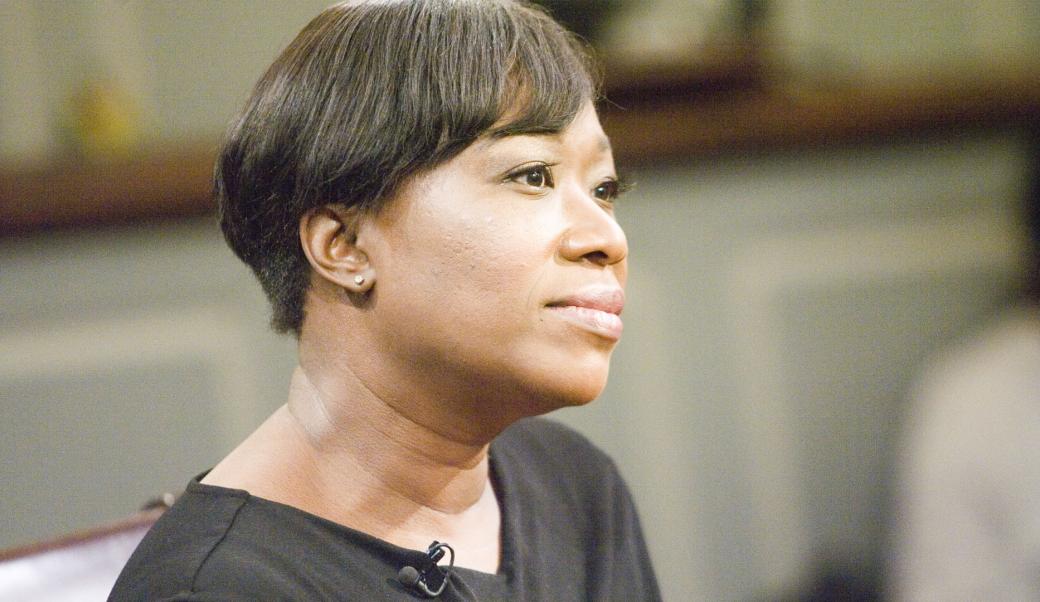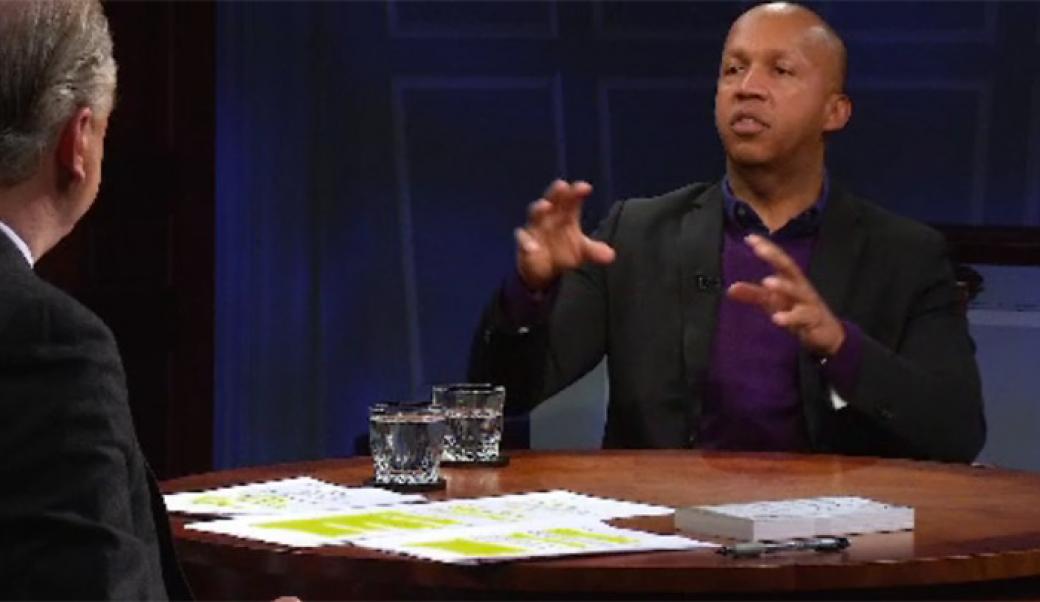About this episode
February 01, 2016
Michael Eric Dyson
Georgetown University Professor Michael Eric Dyson discusses his book, "The Black Presidency: Barack Obama and the Politics of Race in America."
Transcript
00:41 Doug Blackmon: Welcome back to American Forum. Our guest in this episode is Michael Eric Dyson, one of our nation’s most brilliant and impassioned intellectuals with an especially resonant voice on issues of importance to African-Americans. He has written a new book: The Black Presidency, Barack Obama and the Politics of Race in America. Not long ago, many of us had begun to believe that the election of a black president meant somehow that the deep racial divides in our country--and our politics, might finally be disappearing. Instead, after what feels like a wave of police shootings, angry responses from citizens, a horrifying white supremacist massacre in Charleston South Carolina, a surge of racist rhetoric, and at times a seeming impotence on the part of our president. Dyson’s book arrives at a moment when the nation is as embroiled in racial unrest and disappointment as it has been in a generation. Thanks for joining us.
Michael Dyson: Thanks for having me.
Blackmon: That was a really depressing intro that I just did. Is it really as bad as that?
Dyson: I think that if we are honest about it we would have to say yes, pretty much. Your, your kind of brief genealogy of the recent history of racial turmoil and trauma in this country is pretty accurate.
FACTOID: The Question: Was President Obama good for African Americans?
We began with Barack Obama’s election to believe, many did, that we’re living in a post-racial society. Ah, been been there, done black. Over with it. And what happened of course is that Barack Obama, unexpectedly to some, just evoked all of this racial animus and hostility. You mentioned Dylan Roof the young white man who murdered nine people in that Charleston church. He wrote a kind of crazed manifesto and in it he said you people are taking over basically. I have to do this. Well the only thing we’ve taken over completely is the prison industrial complex. We’ve got a lock on that so to speak.
FACTOID: Black Americans are incarcerated at 6 times the rate of whites
But what’s interesting is that Barack Obama is an emblem and symbol of the rise of black power, not in an old school sense but in the sense of exercising authority in a visible and public manner. And that has brought a lot of hostility across the board. I think many of the black people who have been assaulted by racial animus recently are urban proxies for Obama. Can’t get to him get to them. At the same time I think that Barack Obama has been put into a box. He thinks it’s a black box. He doesn’t really want to be ghettoized to speak about race but to see it that way is to miss an opportunity to lead from the bully pulpit that only the president of the United State occupies in this country.
03:41 Blackmon: You’re not saying that he’s been the perfect president or the perfect African American president for sure.
Dyson: Of course not. Now let me begin by saying he’s been an extraordinary president to be sure. When he came into office the fiscal crisis was crazy. If the first black president allowed the banks to fail that’s a headline you can’t get over. Forget waiting for four years. He might not have made it to the next month. He can’t let the ship of state go asunder because of its heavy financial weight. So we have to bail the banks out which ultimately helped the nation’s economy. He had the TARP; he had the recession money. He bailed out the automobile industry and put them back on the street so to speak there in full wheels. He also gave us health care. All this in the first year or two of his administration which is rather extraordinary. And then he’s faced obstruction the likes of which we’ve ever seen. Even with heavy fueled you know obstructions of presidents in the past, nobody has faced quite what Obama has faced because of that racial layer that’s on top of all that. So he will, I think, in my estimation go down as one of the greatest presidents we’ve ever had. But race will not earn him that plaudit. His dealing with race has been lamentable in many. In fact he practiced racial procrastination. Put it off, put it off, let’s not do it right now. Not say something very obvious. Even his last State of the Union, going out the door. It’s you’re Hail Mary. It’s your swan song, Um, you know you can pretty much say what you want to say within the confines of the parameters of etiquette and so on. Not a mention of Black Lives Matter, which he has on occasion spoken about and quite eloquently. No mention of the prison industrial complex. No mention of police brutality. No mention of citizens of this country the vast majority of whom supported him and the problems that they confront.
FACTOID: See millercenter.org for other episodes in What Now? Series
That is unacceptable because if the price of admission is the denial of our voices once our bodies get in. The price of admission for his presidency cannot be that we are not allowed to speak about with intelligence and instill the issues of race that he has written about brilliantly. He’s failed the nation to push them, to encourage them to deal with an issue. Not in a way that he has to raise his hand and come out of the White House and paint it red black and green although if on the last day he wants to do that I’ll be there with him and go Rafiki Wa Kuumba.
Blackmon: Dashiki in place.
Dyson: Dashiki, maybe a Afro, maybe a gold grill, saying hey, I live in public housing and I’ve been a black man doing it for eight years I’m out. Every president has had to confront it in serious and reflective fashion, some in a reactionary fashion but had to deal with it and not avoid it. He can’t get a pass because he’s a black man for that issue.
06:13 Blackmon: I think he would say, or some proxy of his would say first, when I was running for president in 2008 I was already making it pretty clear that I wanted to be the president of everybody. I want to be this uniter. And that he viewed that as an important transition for the country, in the same way that Hilary Clinton seeking to be the first woman president or just be another president. And President Obama struggled with and navigated that issue in those same ways. He has spoken about race periodically and sometimes in these quite eloquent ways as after the terrible massacre in Charleston and the speech he gave in Selma that you write about in the book. But so the, but I think in a sense of what you’re saying about much of his presidency is that those things are insufficient.
Dyson: Well yeah, you laid them out. Let’s take them one by one if I can remember them. So first of all when he’s talking about I want to be the president of all Americans. Ok I want you to be the president for all Americans too including African American people. I’m arguing you haven’t been the president of all Americans. You’ve excluded African American people from the most serious central consideration you might yield. So the point is that Barack Obama has enjoyed and has pursued the black electorate through various channels and so in some ways I know I was there I was part of the people who supported him and vigorously so.
FACTOID: Obama won 96% of black vote in 2008, carried 93% in 2012
And when you talk about and I said this to the President face to face in the White House, his approach is let’s – a rising tide lifts all boats. I can’t specifically aim toward black people. Targeted policies don’t work. I believe in universal. I said, Mr. President, when you go to the emergency ward you don’t get medicine. If you have a hangnail you get aspirin. If you have diabetes you get insulin. If you have cancer you get chemotherapy. Medicine is targeted and works best when it targets the illness that is in the body. So I think that his own philosophical outlook in regard to social transformation and public policy muted the concern of race. Ah, and he used to echo William Julius Wilson the great sociologist from Harvard. Even Wilson changed his mind and said you know what, I no longer believe that. You’ve got to target it and speak specifically about poverty and the like, so that’s it. In terms of the programs he’s done, look, that’s great but when you stand before America and offer a charitable interpretation of black men as futures the response to police brutality is my brother’s keeper? Humm. So let me get this right. You are the president who has public policy in his panoply and can use executive orders, we know. Maybe the Supreme Court will reject what he did with immigration and the like. But he made an executive order about that and one in regard to gun control. So it seems to me that when it comes to the President, black people get charity not justice. Martin Luther King, Jr. said charity is not as book as justice. I think that he’s got to address this issue in a way that’s forthright. And thirdly, yes, he’s spoken brilliantly at points about race when he’s been pushed. Barack Obama has been forced mostly into those issues in his speeches and certainly not enough. The last year much better than what he did before but there was an evolution and we have to be honest about that.
Blackmon: And what would, very quickly, what would the, what would have been an executive action that he could have taken that would have somehow been meaningful to you in this regard? What might that have been?
Dyson Look you can talk about the very interest of America in regard to policing is to say you know, a) people have to live in the neighborhood that they police. Alright? In terms of the actual recognizable policies right? People who live in Delaware go over to police people in Baltimore we get the Freddie Gray situation. People living outside of Ferguson, they come to Ferguson. It seems to me that one executive order could be that when a prosecutor is engaged in reflecting on whether or not to send a case to the grand jury that the protocol be that we have a special prosecutor the way Cuomo mandated in New York. And to put forth at least from the Justice Department a strong argument that such a measure should be adapted locally, there’s no federal intervention in the name of this concern without local recognition and so I’m not, you know, silly about that. But there is something that the President could do to suggest that this is a serious issue and that prosecutors who work with police people are not likely to put them to the test in terms of being put before a jury.
09:28 Blackmon: You write in the book at one point, you say, “if Obama’s delivery on race is sad and disappointing, the failure of most black Americans to hold him accountable is no less.” Who were you talking about and what are you talking about when you say that?
Dyson: I’m talking about the masses of black people. Look there’s a reason that the masses of black people love for Obama. Because the white American has had 43 presidents and black people have had one. Now many white brothers and sisters remind me you know he’s half us. Ok so we’ve had 43 and a half white guys and half a brother in the White house. The reality is that black people are understandably protective of him and why not? The man has received disproportionate amounts of threats, incredible disrespect. What other president has had Jan Brewer the governor of Arizona put her finger in his face like he’s a little boy? What other president has been called a boy by two presidential candidates recently on the Republican side? And on and on and on. A cypher, a monkey, a black box. The things he has been called, he and Mrs. Obama, have been extraordinary. And he is an incredibly cool customer to be able to deal with that. But the problem is is that not only has he spoken about race when pushed to do so, he has spoken about race but mostly in negative toward African American people. He has scolded black Americas. He has chided black Americans. The kind of moral stuff you know, pull up your pants, don’t feed your kids chicken, and then you know when he goes to graduation ceremonies where he’s a commencement speaker at an historically black college like Morehouse, he’s telling them about you know making excuses, sir they haven’t made any excuses, they’re graduating. So I think the level of disrespect that President Obama has shown that many black people won’t even recognize, failed to acknowledge for obvious reasons. To think that the person that you worked so for to put in office has harbored such negative sentiments towards you would be something difficult to abide psychologically. And plus, black people hear it all the time. It’s not like they don’t hear what Obama is saying, those kind of stern chidings. We heard it from Bill Cosby.
11:44 Blackmon: And how did that turn out?
FACTOID: Cosby said poor blacks didn’t work hard, criticized unwed mothers
The politics of respectability. But those are also things though that I wonder about as I read your passages that dealt with this very thing. Ah, and there were so many people and even others who were very incensed particularly by that one commencement speech he gave at Morehouse the most elite institution for black males, arguably, at least according to Morehouse Man, and the and that sense of how all the places that these things could be invoked how could they be invoked here? There was a tone deafness to that that was striking. But you also describe an experience in the book, you have been around President Obama a bit and interviewed him in the Oval Office. You describe at one point a being with a gathering of African American intellectuals in the Roosevelt Room I think in the White House And the, and you, and at some point the President says and it’s really directed at you, says I’m willing to take criticism, to argue with me about policy but what I can’t stand are critics who question my blackness. Which is the very thing you were just jokingly doing.
Dyson: But not in that, you see but he was talking about well really he was probably talking about Cornell West and he might have been talking about Tavis {Smiley} because he knew I made the distinction between public policies. I don’t question his blackness. He’s as black as the man that we produced especially behind the scenes. And the many tropes and ideals of blackness that he embodies smoothly and effortlessly I would never challenge his blackness. What I would challenge is the application of his own bully pulpit to black people. His internal, if you will, reprovals and scoldings of black people and the failure to make the vast majority of Americans aware of some of the issues that confront black people. Now when forced to he does. But here’s the problem. Most black folk have not wanted, those of us who have been inclined to to force him to do so. And Obama has said presidents only do what they are forced to do. And he said this to Wolf Blitzer when he was being interviewed. He said who did Dr. King endorse among you? He said, nobody. What Dr. King would do would get the people together and have them hold us accountable. Now isn’t that interesting? Obama said it, if we try to do it that’s a problem.
13:51 Blackmon: One of the ironies really of this period of time has been that I don’t think it’s unfair to say that the Republican Party, the conventional Republican Party even now the profoundly threatened conventional Republican Party really had no meaningful initiative or intentions around attracting African American voters for a very long time. They really wanted to they just couldn’t pull it off and then but we have seen some activity around the idea of making a conservative case of African Americans in the years and it primarily comes from Tea Party type folks and Libertarians ah that kind of fits what you were just saying. But one of the messages in all that that has gotten some current free tune has been this claim that African Americans are on a new plantation that the language. And that plantation is the Democratic Party and the Democratic Party owns black Americans.
FACTOID: black support for Democrats averaged 88% since 1980
And there are a lot of black voters and black folks out there who will express frustration that at times why do we just keep voting for those Democrats what do we get out of it? Some version of what you are saying. But does the Democratic Party by and large own African Americans?
Dyson: Wow! Massa Clinton. Massa Obama. Right, right. Massa Obama would be an interesting improvement wouldn’t it? Although if you read Larry Koger a certain percentage of black people also owned slaves so that wouldn’t exempt President Obama. No I think, you know the only time it seems to me the right wing or Conservatives who want to bring up slavery is to entice somebody else not to be not so critical. There is enough slave stuff in your history and tradition in the past my brother and sisters on the right not to have to look far afield. The metaphor works for them. But they said you know I think was it that Ben Carson said that Obamacare was the worst thing since slavery? The affordable care act and so on and so forth. They toss that slavery metaphor around pretty loosely I think it doesn’t fit. It’s inaccurate. I don’t think, now, now that doesn’t mean that black people are not dissatisfied, we’re being taken for granted.
15:50 Blackmon: And maybe it’s just that African Americans have by and large have no other recourse.
Dyson: What other recourse is there? That’s a great point. So the point is we could you know, Bernie Sanders is surging in the race now people think that’s a powerful recourse. But what’s interesting when he was asked a question about reparations and so on and Ta-Nehisi Coates recently wrote a piece in The Atlantic taking him to task that is Bernie Sanders because Bernie Sanders he said if you’re Bernie Sanders said well reparation is too divisive. You’re a Democratic Socialist. Is that not divisive right there? Oh yea, that’s going to ring big time in Kansas. So what’s interesting is the fact that Bernie Sanders even patron saint of the left finds an interest in a specific excavation of a terrain of American culture around the issue of race and slavery too radioactive, too problematic so even if the far left finds it problematic what choices do black people have but to work with what you got. And you know, we can say yes, we’re dissatisfied with what’s going on in the Democratic Party but dad gum, does that mean we run to the arms of the right wing which has shown no manifest of ability to a) be sensitive to the interest of African American people? Recently outreaches have been interesting. They did an autopsy a couple three years ago of the Republican Party although most of their candidates have ignored it. Reince Priebus (Republican National Committee Chairman) maybe discouraged by that but the reality is that you don’t run into the arms of people who are further away from a sense of some engagement with your issues because the people closest to you have failed to do so. So you engage in constructive critique. You engage in serious resistance. Black Lives Matter movement says we will not be partisan in that sense. We will hold everybody’s feet to the fire and hold politicians accountable to a degree that has worked both with Clinton and Sanders in terms of putting these issues, pushing these issues to the foreground. But yeah there’s some legitimate disgruntlement with what’s going on. But you know all relationships have disgruntlement. You know, you don’t just leave at the first sign although we’ve been married for a long time to the Democratic Party at least since FDR and there’s been I think progressive disgruntlement and arguing about are there alternatives. Is there a third party? Can we go the green party? Can we do a black political party? None of those thing really worked so black people are by situation coerced into a relationship with the Democratic Party but also using and leveraging that position to demand some issues be put on the agenda that otherwise would not be there.
18:29 Blackmon: And what would, very quickly, what would the, what would have been an executive action that he could have taken that would have somehow been meaningful to you in this regard? What might that have been?
Dyson: Well look you can talk about the very interest of America in regard to policing is to say you know, a) people have to live in the neighborhood that they police. Alright? In terms of the actual recognizable policies right? People who live in Delaware go over to police people in Baltimore we get the Freddie Gray situation. People living outside of Ferguson, they come to Ferguson. So it seems to me that one executive order could be that when a prosecutor is engaged in reflecting on whether or not to send a case to the grand jury that the protocol be that we have a special prosecutor the way Cuomo mandated in New York.
FACTOID: Cuomo asked state attorney general to investigate police-related deaths
And to put forth at least from the Justice Department a strong argument that such a measure should be adapted locally, there’s no federal intervention in the name of this concern without local recognition and so I’m not, you know, silly about that. But there is some things that the President could do to suggest that this is a serious issue and that prosecutors who work with police people are not likely to put them to the test in terms of being put before a jury.
FACTOID: Visit firstyear2017.org for more advice for the next U.S. president
19:57 Blackmon: President Obama will soon not be President Obama, will not be in the office.
Dyson: I’m going to miss him. I’m going to miss him man.
Blackmon: But he’s a very young man. He’s 54 years old. If in fact he has stopped smoking and didn’t used to not smoke then he’s going to be around for certainly 30 years maybe 40 years maybe much longer than that. Is he kind of a quasi-president for the next generation or two?
Dyson: Yeah, the president he said of black America he might become. So not a bad second job. Martin Luther King, Jr. had it, Jessie Jackson, Al Sharpton. I don’t know if they want to share Sharpton with Obama but Obama is extremely beloved. He will be much more than a president of black people defacto so to speak. But he will be extremely well loved and regarded across the board.
Blackmon: But does he become a kingmaker in the way that Bill Clinton tried to become a kingmaker but could not quite accomplish?
Dyson: I think that look his influence is huge. He may be a kingmaker in terms of anointing the next one whether that’s a person running for president or the Senate and so on. His voice will be heard. His influence will be felt. And I suspect many of us will miss him.
21:08 Blackmon: There’s another quote that Dr. King was fond of borrowing from Ghandi which he says nonviolence, civil disobedience is only effective when the oppressor loved the oppressed. It is challenging that beloved between these two parties had been nonviolence civil disobedience actually has an affect opened the eyes of the oppressor. What’s your bottom line view? Do the oppressors love the oppressed enough in America for this wound to be healed?
Dyson: Yes it’s a powerful question you raise there and as many theologians have talked about Jürgen Moltmann prisoner of hope. So in that sense I’m hopeful and hope against hope, hope against hope what does that mean? That means even when there’s no evident reason to hope there’s something you’ve got to pull upon and that is the history and tradition of black struggle against white supremacist, social injustice, economic inequality, the oppressor living the oppressed. You know we might say where is the love? We don’t feel it. At the same time Martin Luther King, Jr. understood that you have to love the hell out of the oppressor. What is most bitter than losing your life in a church at a prayer meeting because of your openness and taking the bible seriously. Be careful to keep strangers out less you entertain angels unaware. This young white man exploited the humanity of the black people that he denied by killing them The very raison d'être that fueled his hate filled crime was repudiated by the love he saw and it almost stopped him. He said I had second thoughts.
22:53 Blackmon: When Dylan Roof went into that church he encountered probably the only people who loved him in his world. This derelict soul. And he encountered one day who loved him in a very long time and he killed them.
Dyson: Well black love creates second thoughts for white supremists, for social injustice, but also uses it as a metaphor to deal with other –isms, other forms of oppression because it must be race and sexual orientation. Black people can’t hold on to the same bible that was used against us and then justify homophobia. Well that’s different because gay people chose to be gay and I’m black by birth. Ok, so when did you chose to be heterosexual? Nine years old you said hey mama I’m going to need a black book and fast car because I’m about to highlight these ladies. That’s not how it goes right? So people inherit vocabularies understanding of the world and it teaches us to be a bit more sympathetic and sympathetic to those who struggle with their own white privilege and whiteness against a stream of white supremacists to become who they are. I mean everybody can’t be Douglas Blackmon the most loved white man in black America maybe besides Bill Clinton. But you know. You might be taking Bill’s throne, I don’t know. You and Bill Maher you all might be the people. So the reality is that we’ve got to figure out the principal and practice of as a social diagnosis who’s answer it is and as a way to push forward beyond one’s own disbelief in one’s own abilities to overcome. Martin Luther King, Jr. said you can doubt but you can’t open that we lose hope because if we do that you lose perspective in life. It’s about serious on the ground engagement with evil in its face and the refusal to see to it the ultimate priority or the ability to determine what we are as human beings. And in that sense I’m down with the King tradition.
Blackmon: Yours is an extraordinary American voice.
Dyson: Thank you my friend.
Blackmon: Michael Eric Dyson. The author of The Black Presidency, arriving in bookstores this month, February 2016. Thank you for being here.
Dyson: Thank you for having me.
Blackmon: We hope you’ll join the conversation with American Forum on the Miller Center Facebook page, or by following us on twitter @douglasblackmon or @AmericanForumTV, or @MichaelEDyson. To send us a comment about this program or download Podcasts or Transcripts, visit us at millercenter.org/americanforum. I’m Doug Blackmon, see you next week.
